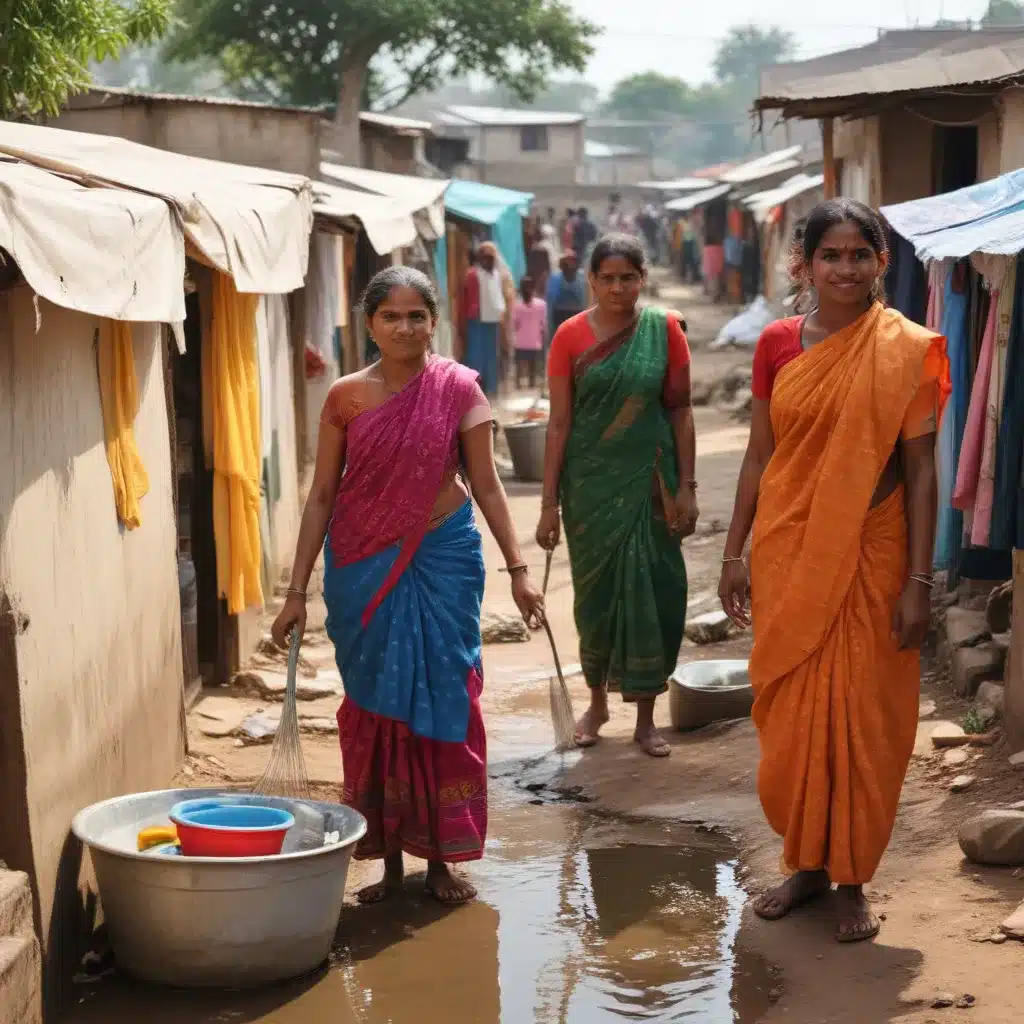
Informal Settlements and Marginalized Communities: A Complex Challenge
Informal settlements in Hyderabad, India, are home to some of the city’s most vulnerable and marginalized populations. These densely populated, underserved communities often lack access to basic water, sanitation, and hygiene (WASH) services – a critical determinant of health and wellbeing. Residents of informal settlements, including children, older adults, persons with disabilities, and other marginalized groups, face disproportionate risks to their physical, mental, and social welfare due to inadequate WASH infrastructure and services.
Addressing the WASH needs of these marginalized communities requires a comprehensive, multi-stakeholder approach that centers the voices and experiences of those most impacted. By understanding the unique challenges faced by vulnerable groups and leveraging both formal and informal service delivery mechanisms, we can work towards equitable and sustainable WASH solutions in Hyderabad’s informal settlements.
Profiling Vulnerable Groups in Informal Settlements
Children and Child-Headed Households
Children living in informal settlements, including those heading their own households, face significant vulnerabilities. They may experience biological and physical challenges, strategic challenges due to limited autonomy and dependence on adults, and institutional invisibility from policy agendas. Ensuring their access to safe WASH services is critical for healthy child development and preventing waterborne illnesses.
Older Adults
Older residents of informal settlements often lack access to regular income, work, and healthcare. Their declining physical and mental capacities, combined with dependence on caregivers who also face health and wellbeing challenges, leave them highly vulnerable. Tailored WASH interventions and caregiver support are essential to address the needs of this population.
Persons with Disabilities (PWDs)
Persons with disabilities living in informal settlements are frequently assumed to be unable to work, further exacerbating their vulnerabilities. They face physical, communication, and attitudinal barriers to accessing WASH services, as well as a lack of awareness and sensitivity about their unique circumstances. Inclusive WASH infrastructure and community-based support are key to empowering PWDs.
Leveraging Formal and Informal WASH Service Delivery
Hyderabad’s informal settlements are characterized by the near-absence of formal WASH service providers, leaving residents to rely heavily on informal actors and networks. While informal support can be essential, it also faces limitations in terms of skills, knowledge, and capacity.
The Role of Formal Actors
Formal WASH service providers, such as government agencies and NGOs, possess technical expertise, resources, and the potential to coordinate interventions at scale. However, they are often perceived as disconnected from the realities of informal settlements and unresponsive to the needs of marginalized groups.
The Importance of Informal Actors
Informal WASH service providers, including community members, religious institutions, and local organizations, play a crucial role in filling gaps left by the formal sector. They possess deep contextual knowledge, established trust within the community, and the ability to provide immediate, personalized support. However, their services may lack consistency, oversight, and specialized skills.
Fostering Complementarity between Formal and Informal WASH Actors
To address the unique WASH needs of marginalized groups in Hyderabad’s informal settlements, a synergistic approach that leverages the strengths of both formal and informal service providers is essential. This complementarity can manifest in several ways:
Roles and Responsibilities
Formal actors can provide the technical expertise, resources, and coordination needed to scale up WASH interventions, while informal actors leverage their community ties and contextual knowledge to ensure local relevance and ownership.
Rules, Regulations, and Governance
Formal actors can help navigate complex regulatory frameworks and ensure accountability, while informal actors can provide insights into community-based norms and facilitate trust-building with marginalized groups.
Knowledge and Skills
Formal actors can offer specialized training and capacity-building support to informal service providers, enhancing their ability to address the complex needs of vulnerable populations.
Information Flows and Referrals
Formal actors can establish clear communication channels and referral mechanisms, empowering informal providers to connect marginalized individuals with the appropriate WASH services and resources.
Transition and Sustainability
Formal actors can work to institutionalize support systems and ensure continuity, while informal actors can facilitate community ownership and adaptive capacity to respond to changing needs.
Towards Equitable and Sustainable WASH Solutions
Leveraging the complementarity between formal and informal WASH service providers is a crucial step in addressing the unique needs of marginalized groups and vulnerable populations in Hyderabad’s informal settlements. By fostering collaborative partnerships, enhancing information flows, and building the capacity of both formal and informal actors, we can work towards the following key objectives:
-
Inclusive and Accessible WASH Infrastructure: Ensure that WASH infrastructure and service delivery models are designed to meet the needs of diverse user groups, including children, older adults, and persons with disabilities.
-
Empowered and Engaged Communities: Strengthen the capacity of informal WASH service providers and community-based organizations to advocate for their rights, participate in decision-making, and co-create sustainable solutions.
-
Coordinated and Responsive Service Delivery: Establish robust referral systems, communication channels, and collaborative mechanisms between formal and informal WASH actors to enhance the responsiveness and effectiveness of service provision.
-
Holistic and Integrated Approaches: Integrate WASH interventions with other social services, such as healthcare, education, and social protection, to address the multidimensional needs of marginalized groups.
-
Evidence-Informed Policymaking: Generate and utilize data, community-based insights, and stakeholder feedback to inform the development of inclusive WASH policies and programs that prioritize the needs of vulnerable populations.
By embracing the complementarity of formal and informal WASH service providers, we can work towards equitable and sustainable WASH solutions that empower marginalized communities and enhance the health and wellbeing of all residents of Hyderabad’s informal settlements.

